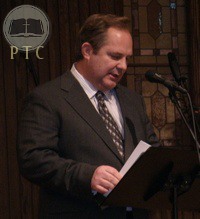Preserving Some Truth
On Friday and Saturday (January 7-8), more than three hundred registered attendees (and about that many more walk-ins for the evening service) gathered for a “symposium on biblical separation.” I’m pleased to have had the opportunity to be among them.
Though the event could be improved in some substantial ways, it was an important step toward developing a biblical separation model that (a) improves on what separatists have practiced in the recent past and (b) functions better in the current evangelical landscape in America.
A significant plus is that this more theologically grounded and thoughtful approach to separatism stands a chance of winning the acceptance of theologically serious young people within fundamentalism (but on their way out) or outside fundamentalism but still listening to its better representatives.
Host pastor Mike Harding described the goal as a “theologically robust” and “biblically consistent” separatism as well as “cultural conservatism.”
What follows is a survey of conference highlights followed by some analysis.
Conference highlights
The event began with two workshop periods of about an hour each. Due to a snow storm I hadn’t anticipated, I missed the first hour and walked in just as the second was about to begin. Since I was late, I just headed straight for the nearest workshop.
It turned out to be one in which Dr. Bruce Compton provided an analysis of Wayne Grudem’s view of the NT gift of prophecy (a non-authoritative and potentially erroneous cousin of the OT gift). Grudem’s view has been foundational for much of current non-cessationist thought about the gifts of the Spirit. Compton’s analysis was interesting and helpful and highlighted some of the unresolved problems with Grudem’s view. The session concluded with brief consideration of whether non-cessationism is a separation issue. Compton’s view was that personal fellowship with non-cessationists was not a problem, but that continuationism’s threat to our belief in a closed canon is serious enough to preclude some other forms of fellowship. He explained that this included avoiding ministry cooperation and pulpit cooperation with non-cessationists.


Discussion